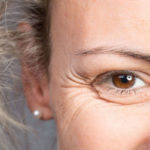What Causes Eye Bags
There are several factors that contribute to the development of eye bags, including genetics, external factors, and lifestyle choices.
A diet high in salt can lead to water retention and eye bags. Allergies can also cause swelling and bags under the eyes. Other factors include genetics, aging, and other factors such as chronic rubbing, swelling around the eyes, and seasonal allergies.
When it comes to aging, it is often associated with a weakening of the supportive skin structures. Additionally, fluid can accumulate in this area, leading to swelling.

Aging can cause a weakening of the supportive skin structures, leading to swelling and eye bags.
As we age, we lose collagen and elasticity, which can contribute to dark circles and eye bags. The loss of collagen and looser skin can cause fat pads to protrude, contributing to swelling.
5 Mistakes to Avoid to Reduce Eye Bags
Not Drinking Enough Water
Dehydration can also cause the body to retain water, leading to eye bags. Drink plenty of water throughout the day to help flush out excess fluid and keep your body hydrated.
Consuming Highly Processed Foods
These products tend to be high in sodium, preservatives, and other ingredients that can cause inflammation and eye bags. Opt for a diet rich in whole, nutrient-dense foods such as fruits, vegetables, whole grains, and lean proteins.
Excessive Salt Intake
Processed foods also tend to be high in salt, and consuming too much salt can cause water retention in the body, leading to eye bags and a puffy face. Avoid packaged and processed meals that are high in sodium.
Not Eating Enough Fiber
A low-fiber diet can lead to constipation and bloating, resulting in eye bags and facial swelling. Eat plenty of fiber-rich foods, including fruits, vegetables, whole grains, and beans, to promote healthy digestion and reduce inflammation.
High Sugar Consumption
Eating too much sugar can cause inflammation in the body, contributing to eye bags and puffiness. Opt for natural sweeteners instead of sugary foods and beverages.
It is best to avoid rubbing your eyes as this can cause further inflammation. Wearing sunglasses and using sunscreen to protect the delicate skin around your eyes can help prevent collagen breakdown and, consequently, eye bags.
Additionally, pay attention to treating eczema or allergies, as those conditions can lead to rubbing or scratching the under-eye area.
Eight Strategies for Preserving the Skin Around the Eyes & Fighting Aging Symptoms
Looking to keep a youthful look and ensure eye health? Read on to discover how to maintain the area around the eyes and reduce the effects of aging such as crows feet and dark circles.




































